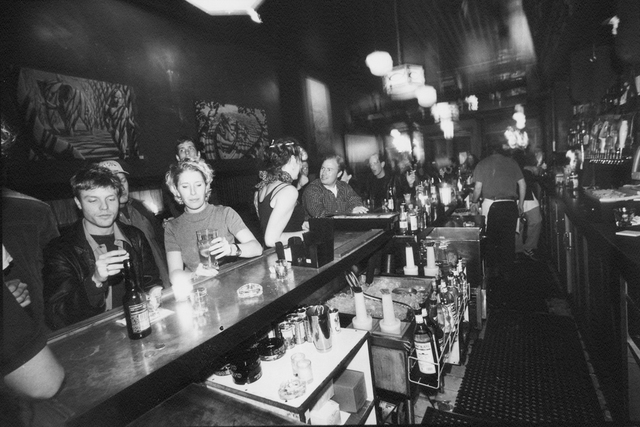Whenever I crack a can of Squirt, my husband and I chant together, “Soft drinks have no regular place in a pregnancy diet.” This sterling truth was found in the pregnancy bible What to Expect When You’re Expecting. Statements such as this beg the kind of tautological hair-splitting usually reserved for issues theological: “Soft drinks have no place? OK, like, what if the pregnant woman is dying of thirst in the desert and the oasis only has a Coke machine? Would there be a place then?”
With their multi-culti soft pencil illustrations of women dressed in dowdy jumpers made of organic fibers, pregnancy books represent the ne plus ultra of post-feminist liberalism. “Natural” here is the highest good—natural foods, natural childbirth, even natural hair color. But deeply embedded in these seemingly pro-woman texts is a profound ambiguity about women’s bodies and who owns them. Women are everywhere encouraged to privilege their baby’s needs and suppress their own. Rule of thumb: If it gives the pregnant woman pleasure, it’s right out. (Even sex is rigorously separated from its glorious dirty self and relegated to the dry and dutiful dustbin of “lovemaking.” Sex in pregnancy isn’t about getting off—it’s about “strengthening” your relationship and “preparation for labor and delivery.”)
Don’t get me wrong—the mission of these books is laudable. They grow from the Our Bodies, Our Selves tradition of empowering women with knowledge. A thumbnail of the shift that has taken place, in part thanks to books promoting self-determination of one’s health: When my mother was pregnant with me in the mid-’60s, her diet consisted of equal parts gin, cigarettes, and doctor-prescribed amphetamine. Mom’s idea of a cute prenatal anecdote: “I would rest my ashtray on my stomach while I smoked, and you would just kick it right off!”
But with women’s reproductive rights being threatened through the back door by the latest flurry of “partial-birth abortion” bills, it seems a good time for vigilance. Women’s bodies, as has been gaseously brought home to me throughout my pregnancy, belong to no one but themselves. In liberal, educated America, where we like to think we’ve swallowed our dose of feminist inoculation against misogyny, pregnancy books reveal how left-leaning people believe an unborn child to be the property of society.
Nowhere is this more evident than when pregnancy books talk about food. Science is often disregarded in an effort to warn women of the dangers ahead. Caffeine is a big “no,” yet the writers will say in the same breath that no birth defects are linked to it. Says What to Expect: “Human studies to date have shown no harm from moderate use—up to three cups of coffee or the equivalent in other caffeinated beverages in a 24-hour period—throughout pregnancy.” Forthwith, two full pages on how and why to give up caffeine. True, excessive coffee drinking has been linked to early miscarriage. But surely women can be trusted to differentiate between “moderate” and “excessive.”
Or try this soul-deadening exercise at home, if you dare: “Before you close your mouth on a forkful of food, consider, ‘Is this the best bite I can give my baby?’ If it will benefit your baby, chew away. If it’ll only benefit your sweet tooth or appease your appetite, put your fork down.” You only want to appease your appetite? How dare you?! Bad mommy!
I have a pregnant friend who’s ripping up the carpets in her house—she prefers hardwoods. The typical reaction is flat-out horror: “But toddlers love to crawl on carpet!” My friend’s response? “I live here, too.” Pregnant women would do well to remember her words. We all live here in our bodies, and we may on occasion want to eat candy, or hot dogs, or even—you knew it was coming—drink wine.
Says one book: “There is no established safe daily dose of alcohol for pregnant women, but studies have found that more than one drink a day increases the risk of mild to serious mental retardation.” Another: “The safe daily alcohol dose in pregnancy, if there is one, is not known.” Of course an educated pregnant woman knows any kind of daily drinking is a bad idea—but what of the occasional celebratory glass of wine? The books say no, the bartenders at Red Robin say no, and women end up feeling itchy and guilty when they hoist a glass. As my favorite pregnancy book, The Girlfriend’s Guide, says, “Your doctor may put me on America’s Most Wanted for saying this, but I think that women who are coming to the end of a healthy and uneventful pregnancy deserve an occasional glass of wine before bed.”
My doctor, in fact, on hearing that I drink wine with dinner when not pregnant, rushed to tell me a glass every week or two in my pregnancy shouldn’t be a problem. Unlike the pregnancy books, the doc was concerned with the happiness and well-being of the mother as well as that of the child.
Not only does this aggressively cautionary mood get up my nose politically, I have a more personal response as well: This is not the kind of mom I want to be. Do I really want to take advice from a woman who opens her book with these words: “I was pregnant, which about one day out of three made me the happiest woman in the world. And for the remaining two, the most worried.” Granted, every woman has the right to be worried during her pregnancy, just as she has every right, legally, whether we like it or not, to be drunk or stoned or even to eat junk food. But I no more want to take advice from a chronic worrier than I do from a drunk or stoned woman or from a negligent eater. Besides, worrying is just as self-indulgent as eating crap or drinking wine: An uptight, fraught host body is no good for a baby either.





